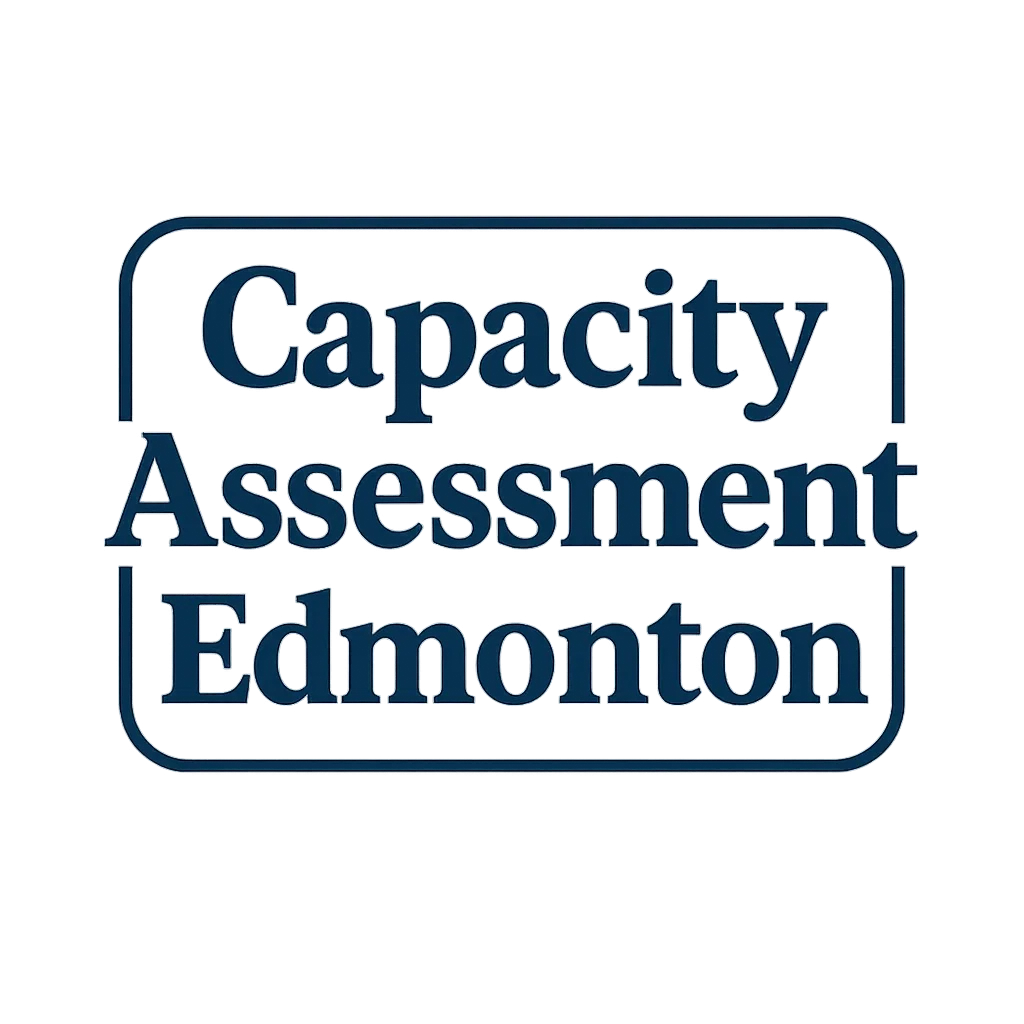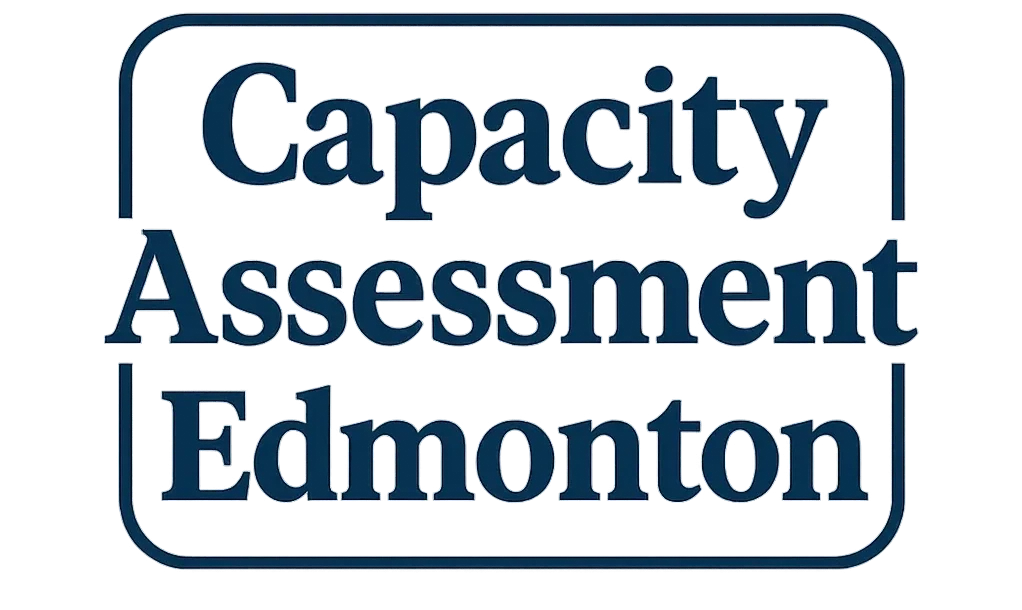Capacity Assessment Fees
Capacity assessor near me
July 31, 2025

Behind the Numbers: A Personal Dive into Edmonton’s Capacity Assessment Fees and Real-World Services

Let’s be honest: The first time I heard the phrase “capacity assessment Edmonton,” my head swam with questions (and not a little concern about money!). When my uncle needed help managing his affairs, finding reliable information on costs, process, and real-life expectations felt like a maze. In this blog, I set out to demystify capacity assessment services in Edmonton – drawing from my own winding journey, real conversations, and the actual price tags you’ll run into. If you’re navigating this world for a loved one, or just want to know what ‘capacity assessment’ really means, grab a coffee and let’s dig in together.
Sticker Shock and Reality Checks: Understanding Capacity Assessment Fees in Edmonton
If you’re like me, the first time you hear about capacity assessment fees in Edmonton, you might do a double take. I remember sitting at my kitchen table, calculator in hand, trying to make sense of the numbers. It’s not just the dollar amount that catches you off guard—it’s the feeling of uncertainty about what exactly you’re paying for, and whether you’re missing any hidden costs. Let’s break it down, step by step, so you know what to expect and how to plan.
What Are You Actually Paying For?
In Edmonton, the standard capacity assessment cost is $500 for either a guardianship/co-decision making or trusteeship assessment. If you need both (guardianship and trusteeship), the fee is $700. These aren’t arbitrary numbers. They reflect the time, expertise, and legal compliance required by a Designated Capacity Assessor (DCA)—like Mukesh Mishra, who provides these services in Alberta. The process often includes:
- A formal interview with the person being assessed
- Review of medical and personal information
- Preparation of a court-ready Capacity Assessment Report (CAR)
It’s a thorough process, not just a quick chat or a checklist. The DCA’s specialized training and the need to meet legal standards are built into the fee.
Surprise Charges: When Do Extra Travel Costs Apply?
Here’s where things can get tricky. While the base fees are clear, travel costs for capacity assessment services may apply if the assessor needs to travel outside standard locations—say, to a rural care facility or a private residence far from Edmonton’s core. These travel fees aren’t always spelled out up front, so it’s smart to ask early in the process. Research shows that in outlying communities, these extra charges can push the total cost higher than the Edmonton average.
Why Price Transparency Matters (A Family Tale)
I learned the hard way that not asking about all possible fees can lead to “sticker shock.” When my family needed a capacity assessment for a relative, we budgeted for the base fee, only to discover after the fact that extra interviews and travel time added several hundred dollars. It was stressful, and it distracted us from focusing on our loved one’s needs. That’s why I appreciate the words of Mukesh Mishra, DCA:
“Transparent fees allow families to plan and focus on their loved one, not just the bill.” – Mukesh Mishra, DCA
Edmonton’s Fee Structure vs. Alberta and Beyond
Most Edmonton guardianship services costs align with the provincial average. However, if you’re outside the city, expect to pay more—sometimes significantly more—due to travel and availability of assessors. Edmonton’s market is competitive, which helps keep the base rate stable, but always check with your provider for a full quote.
Where Does the Money Go?
It’s not just paperwork. The fee covers:
- Expertise of a qualified DCA
- Time spent in interviews and assessments
- Preparation of detailed, court-ready reports
- Compliance with the Adult Guardianship and Trusteeship Act (AGTA)
Every step is crucial for your application to be accepted by the court.
Can Government or Insurance Help?
Some families hope for financial support. While there are occasional grant programs or government subsidies, most insurance plans don’t cover the full trusteeship assessment fees in Edmonton. And, unfortunately, these fees are not usually tax-deductible. It’s worth checking, but don’t count on outside help to cover all costs.
Common Budgeting Pitfalls
- Forgetting to ask about travel costs
- Assuming insurance will pay
- Not budgeting for extra interviews or paperwork
Double-check everything before you book. It’s the best way to avoid surprises and keep the focus where it belongs—on your loved one’s care and future.
Guardianship, Co-Decision Making, Trusteeship: Sorting Out the Legal Maze
If you’re like me, the words “adult guardianship trusteeship” probably sound intimidating at first. I remember the first time I had to navigate this process for my aging parent in Edmonton. It felt like stepping into a legal maze, full of terms I’d never heard before and decisions that felt heavy. But once you break it down, the differences between guardianship, co-decision making, and trusteeship start to make sense—and understanding them is essential for anyone facing capacity assessment legal compliance in Alberta.
What’s the Real Difference?
- Guardianship is about making personal and family decisions for someone who can’t do it themselves. Think: healthcare, where they live, day-to-day choices.
- Trusteeship is strictly about finances—paying bills, managing property, handling investments. It’s not about personal care, just the money side.
- Co-decision making is a middle ground. Instead of taking over, you share decision-making with your loved one. It’s less restrictive and can be a good fit if they just need a bit of help.
All three require a formal capacity assessment in Edmonton, usually done by a qualified professional like Mukesh Mishra, DCA. These assessments are not just paperwork—they’re the foundation for safe, empowered decision-making. As Mukesh Mishra puts it:
“A capacity assessment isn’t just a formality – it’s the foundation for safe, empowered decision-making.”
Why Do Families in Edmonton Need These Assessments?
For me, the need became clear when my parent started struggling with bills and medical appointments. I wanted to help, but the bank and doctors needed legal proof. That’s where the adult guardianship trusteeship plan comes in. Without it, you’re stuck—unable to act, even when it’s urgent.
Research shows that these assessments are required for court authorization in Alberta. The Adult Guardianship and Trusteeship Act (AGTA) governs the whole process, ensuring that every step is legally compliant and tailored to the individual’s needs.
How Assessment Results Shape the Next Five Years
Here’s something I didn’t realize at first: the assessment isn’t just a stamp of approval. It’s a roadmap. The court usually asks for a plan that covers the next five years. This plan outlines exactly who can make which decisions, and how those decisions will be reviewed. It’s not a one-and-done deal—plans are typically reviewed every five years to make sure they still fit the person’s needs.
Health vs. Finances: Why the Split Matters
One of the most confusing parts for families is the split between health and financial decisions. Guardianship covers personal care, while trusteeship covers money. Sometimes, one person handles both. Other times, it’s split between family members or professionals. This division matters because it ensures the right person is making the right kind of decision, based on their strengths and relationship to the adult in need.
Navigating the Legal Maze: The Road Trip Analogy
Honestly, navigating adult guardianship trusteeship in Edmonton feels like planning a long road trip. You map out your route, but there are always unexpected detours—maybe a sudden health crisis, or a change in financial needs. The capacity assessment is your GPS, helping you adjust the plan when life throws a curveball.
Biggest Myths About Legal Capacity Assessments
- Myth: “Guardians get all control.” Reality: Not always. The court can tailor authority to fit the situation.
- Myth: “Assessments are just red tape.” Reality: They’re essential for capacity assessment legal compliance and protecting everyone involved.
In Edmonton, understanding the differences between guardianship, co-decision making, and trusteeship—and how assessments shape your adult guardianship trusteeship plan—can make the journey less daunting, and a lot more manageable.
Meet the Human Behind the Assessment: Designated Capacity Assessor (DCA) Qualifications and Real-World Role
When I first heard the term designated capacity assessor (DCA), I pictured a clinical, clipboard-carrying professional in a sterile office. But my first real encounter with a DCA in Edmonton was nothing like that. Instead, it happened over a cup of tea in a quiet living room, sunlight streaming in, the conversation gentle and unhurried. That moment changed how I viewed capacity assessment services in Alberta—and who’s actually behind them.
Who Are These Professionals? Understanding DCA Qualifications
So, who’s actually doing these assessments? In Alberta, capacity assessors are not just anyone with a medical background. They are qualified health professionals—often physicians, psychologists, or social workers—who have completed specialized training and certification to become DCAs. The standards are set high for a reason. Assessing someone’s ability to make important life decisions isn’t just about ticking boxes; it’s about understanding the whole person, their needs, and their context.
Providers like Mukesh Mishra, DCA in Alberta, are not only certified but also bring years of experience and a patient-centred mindset to their work. As Mukesh himself says:
“A patient-centred approach doesn’t just check a box – it honors the whole person.” – Mukesh Mishra, DCA
More Than Just a License: The Real-World Role of a DCA
It’s easy to assume that being a DCA is just about having the right credentials. But research shows that the best DCAs combine technical know-how with empathy, patience, and strong listening skills. The process often involves interviews, medical checks, and sometimes real-life scenarios to see how someone manages daily decisions. The goal? To create a capacity assessment report (CAR) that is accurate, nuanced, and ready for court if needed.
What struck me during my first meeting was how much the DCA focused on comfort and dignity. There was no rush, no pressure. Just a genuine effort to understand the person behind the paperwork. That’s what separates a great assessment experience from a forgettable one.
In-Home Capacity Assessment: The Personal Touch
One of the most valuable aspects of capacity assessment services in Alberta is the option for in-home capacity assessment. Mukesh Mishra and other DCAs offer assessments not just in clinics or care facilities, but right in the client’s own home. This isn’t just a convenience—it’s a game-changer for many families. Being assessed in a familiar environment can reduce anxiety, make communication easier, and provide a more accurate picture of someone’s abilities and needs.
Some providers, like Mukesh, even offer in-home assessments at no extra charge (though travel costs may apply if you’re outside Edmonton). This commitment to a patient-centred capacity assessment aligns with the Adult Guardianship and Trusteeship Act (AGTA), ensuring comfort, privacy, and compliance every step of the way.
What Makes a DCA Stand Out?
- Expertise: DCAs must meet Alberta’s strict standards and maintain up-to-date certification.
- Empathy: The ability to listen and connect with vulnerable adults is crucial.
- Flexibility: Offering assessments at home or on location shows a commitment to patient needs.
- Attention to Detail: Every assessment is unique, and accuracy in reporting is essential for legal and care planning.
In the end, the human touch—combined with rigorous capacity assessor qualifications—is what truly defines the role of a DCA in Alberta. Whether you’re seeking a capacity assessment for guardianship, co-decision making, or trusteeship, knowing there’s a skilled, empathetic professional like Mukesh Mishra on your side can make all the difference.

From Booking to Final Report: The Capacity Assessment Process Demystified
When I first heard the phrase “capacity assessment,” I pictured something clinical and intimidating—clipboards, stern faces, maybe even a ticking clock. But after going through the process myself in Edmonton, I realized it’s far more approachable, especially when you know what to expect. Here’s my personal dive into the capacity assessment process steps, from that first click to the final report.
Step 1: Capacity Assessment Booking Online
It all starts with booking. Most providers, like Mukesh Mishra, DCA at Capacity Assessment Edmonton, make it easy to schedule an appointment online. I appreciated this convenience—no endless phone calls or paperwork just to get started. The website clearly outlined the capacity assessment features and services, including fees: $500 for guardianship or trusteeship, $700 for both, and a heads-up about possible extra travel costs if you’re outside the city.
Step 2: Scheduling and Preparation
Once I submitted my request, I received a follow-up to confirm details and set a date. This is where the timeline can surprise you. Research shows the process usually takes anywhere from a few days to two weeks, depending on how quickly everyone (including family or caregivers) can coordinate. I learned early on that flexibility helps—sometimes, things drag on due to scheduling conflicts or the need for additional documentation.
Step 3: The Assessment Interview—Not What You See on TV
The actual assessment was nothing like a courtroom drama. Instead, it was a formal, yet conversational interview. The assessor explained each step, asked about daily routines, medical history, and decision-making abilities. Family members were invited to share their perspectives, which made the process feel more holistic. There were also observations and, in some cases, a review of medical or legal documents. No bright lights or trick questions—just a genuine effort to understand the person’s needs and abilities.
Step 4: The Capacity Assessment Report (CAR)
After the interview and any necessary follow-ups, the assessor compiled everything into a Capacity Assessment Report (CAR). This document is the heart of the process—a formal summary that’s submitted to the relevant court or authority. The CAR includes findings from the interview, medical evaluations, and input from family or caregivers. It’s designed to guide decisions about guardianship, trusteeship, or other supports.
Who reads it? Primarily, the court or legal representatives involved in the case. But it’s also shared with the family, and sometimes with healthcare providers, to ensure everyone is on the same page about future care decisions.
Step 5: Surprises Along the Way—If This Were a Board Game…
If I had to describe the process as a board game, there would definitely be some “Chance” cards:
- “Family member unavailable—lose a turn and reschedule.”
- “Missing paperwork—go back two spaces.”
- “Assessor stuck in traffic—draw again next week.”
It’s not always a straight path, but patience and preparation help smooth the ride.
Tips I Wish I’d Known Sooner
- Bring snacks and water—assessments can run long, especially with multiple interviews.
- Double-check all paperwork before your appointment. Missing documents can delay the process.
- Ask lots of questions. As Mukesh Mishra, DCA, says:
“Good communication during assessment turns a stressful process into a manageable one.”
In my experience, assessors welcome questions and want you to feel informed and comfortable at every stage.
The Hidden Value: Patient-Centred Service and Peace of Mind
When I first learned about capacity assessment services in Edmonton, I’ll admit my focus was on the numbers. The fees, the paperwork, the legal steps—these seemed like the most important parts. But as I’ve come to realize, the real value of a patient-centred capacity assessment goes far beyond the invoice or the final report. It’s about the support, reassurance, and clarity that a skilled Designated Capacity Assessor (DCA) brings to families during what can be an incredibly stressful time.
Let’s be honest: seeing a loved one evaluated for decision-making capacity is emotional. There’s anxiety, uncertainty, and sometimes even guilt. I’ve sat with families in Edmonton who were worried about what the process would mean for their parent or spouse. Would it be invasive? Would it feel cold or clinical? Here’s where the right assessor makes all the difference. Mukesh Mishra, DCA, puts it best:
“The greatest value of assessment isn’t in the paperwork – it’s in the peace of mind families gain.” – Mukesh Mishra, DCA
That peace of mind comes from a patient-centred approach. It’s not just about ticking boxes or meeting legal requirements. It’s about maintaining dignity, comfort, and understanding for the person being assessed. In my experience, in-home capacity assessments are a game changer. When adults can stay in their own familiar surroundings, anxiety drops. There’s less confusion, less stress, and a much greater sense of control. Research shows that in-home assessments reduce anxiety for most adults assessed. It’s a small detail, but it makes a world of difference.
What families often overlook is the emotional support a DCA provides. It’s not just the person being assessed who needs reassurance—families do, too. I’ve heard countless stories from Edmonton families who felt a weight lift off their shoulders after a thoughtful, clear assessment. One daughter told me how a well-conducted in-home assessment changed everything for her family. Instead of endless arguments and uncertainty, they finally had clarity. They could make plans—real, sustainable plans—for care and support. That’s the kind of outcome that’s hard to put a price on.
Of course, there are practical considerations. Capacity assessment services Alberta are clearly priced: $500 for guardianship or trusteeship, $700 for both, with extra travel costs if needed. But these numbers don’t tell the whole story. The real value is in the expertise and communication that a good assessor brings. Clear, honest conversations set the best providers apart. They explain the process, answer questions, and make sure everyone understands what’s happening and why.
There’s also a legal side to all this. A well-done capacity assessment supports sustainable planning and helps avoid future disputes. Guardianship and trusteeship plans, for example, outline responsibilities for the next five years and ensure that financial and personal decisions are managed properly. When the assessment is thorough and patient-centred, families can move forward with confidence, knowing they’ve done the right thing—both legally and emotionally.
If I had to sum it up, I’d say a good DCA is like a trusted guide through unfamiliar territory. You might not know the path, but with the right support, you don’t have to walk it alone. That’s the hidden value of capacity assessment features and services in Edmonton: not just meeting requirements, but bringing comfort, clarity, and peace of mind to families when they need it most.
Travel Costs, the Fine Print, and the Odd Surprises (Because Life Happens)
When I first started exploring capacity assessment services in Edmonton, I thought the process would be pretty straightforward. You book an appointment, pay the fee, and get the assessment done. But as I dug deeper—especially when looking at providers like Mukesh Mishra, DCA, at Capacity Assessment Edmonton—I realized there’s a bit more to the story, especially when it comes to travel costs. Let’s break down what you need to know about travel costs capacity assessment services, the fine print, and a few odd surprises that can pop up along the way.
When Do Travel Costs Actually Sneak Into Your Bill?
Here’s the deal: if you’re in central Edmonton, the standard capacity assessment cost is usually clear—$500 for guardianship or trusteeship, $700 for both. But if you live outside the usual service area, travel costs can suddenly appear on your bill. These capacity assessment travel fees aren’t always obvious at first glance. Providers often mention them, but it’s easy to overlook the fine print when you’re focused on the main assessment fee.
From what I’ve seen, travel costs are variable. They’re typically added for service outside central Edmonton, and the further you are, the more you might pay. It’s not a standardized fee, so always ask for a clear quote before you agree to anything. As Mukesh Mishra, DCA, puts it:
“Being up front about travel costs keeps everyone on the same page.”
Quirky Scenarios: The Time the DCA Got Lost in Alberta Backroads
I once heard a story about a DCA who ended up lost on the winding backroads of rural Alberta, GPS signal flickering in and out. It’s funny in hindsight, but it highlights a real issue: travel in remote areas can be unpredictable and time-consuming. In cases like this, travel fees aren’t just about gas money—they cover the extra time, effort, and sometimes even the risk of getting stuck in the middle of nowhere. It’s a reminder that these fees exist for a reason, even if they catch you off guard.
Why Remote/Rural Alberta Assessments Sometimes Cost More
If you’re booking an in-home capacity assessment outside Edmonton, expect higher costs. Travel isn’t just about distance; it’s about time away from the office, potential overnight stays, and the unpredictability of rural roads. Research shows that travel costs for assessments outside standard locations are common and can impact the total fee. It’s not just a line item—it’s a reflection of real-world logistics.
Checking for Hidden Extras: What to Ask a Provider Before You Pay
- Is the travel fee included in the quote?
- How is the travel cost calculated—by distance, time, or a flat rate?
- Are there extra charges for in-home or after-hours assessments?
- What happens if the assessor needs to reschedule due to weather or road conditions?
Many providers clarify travel fees up front, but it’s always smart to double-check. Don’t be shy about asking for a breakdown of all potential costs.
Are You Allowed to Request a Specific Location (and Should You)?
Sometimes, you can choose between an in-home capacity assessment or an office appointment. In-home visits may offer more flexibility, especially for those with mobility issues, but they can add to the overall capacity assessment cost Edmonton residents pay. Always confirm the location and ask if it affects the fee. Some providers offer in-home assessments at no extra charge within a certain radius, but outside that area, travel costs apply.
Tips to Save Time (and Money) When Booking in Less Accessible Areas
- Book well in advance to coordinate with the assessor’s travel schedule.
- Ask if assessments can be grouped with others in your area to split travel fees.
- Check if virtual assessments are an option for your situation.
- Always confirm the total cost—including travel—before you commit.
In the end, understanding travel costs capacity assessment services offer can help you avoid surprises and budget more accurately for this important step.
Bringing It All Home: Reflections, Odd Lessons, and Navigating Capacity Assessment With Heart
If you’ve made it this far, you probably know that capacity assessment in Edmonton isn’t just a line item on a legal checklist—it’s a deeply personal journey. I’ve walked this road myself, and if I could go back, there are a few things I wish someone had whispered in my ear at the start. So, let’s set aside the paperwork for a moment and talk about what really matters when you’re navigating capacity assessment services in Alberta.
First, the numbers. Yes, they matter. The fees for capacity assessment in Edmonton are straightforward on paper: $500 for guardianship/co-decision making or trusteeship, $700 if you need both. Extra travel costs might apply, depending on where the assessment takes place. At first glance, these figures can feel like just another hurdle. But here’s the lesson I learned: the real value isn’t just in the price tag. It’s in the peace of mind you get, knowing you’re doing right by your loved one—and staying on the right side of the law. Legal compliance isn’t just a box to tick; it’s a shield for everyone involved.
But numbers alone don’t tell the whole story. What surprised me most was how much empathy and communication matter in this process. The best capacity assessment services in Alberta aren’t just about forms and signatures. They’re about listening, explaining, and making sure everyone—especially the person being assessed—feels respected. As Mukesh Mishra, DCA, puts it:
“At the end of the day, it’s about dignity for the person assessed and clarity for the family.”
That dignity is easy to lose sight of when you’re knee-deep in paperwork and legal jargon. The system can feel bureaucratic, even bewildering. There were moments I felt lost, unsure if I was asking the right questions or missing something important. If you’re just starting out, don’t be afraid to ask for explanations—again and again, if you need to. Insist on transparency. Good assessors will walk you through the process, not rush you through it.
For families, advocacy and preparation are your best allies. Research shows that when families are informed and involved, the process becomes less overwhelming and more manageable. Write down your questions. Bring a friend or family member for support. And, honestly, don’t underestimate the power of laughter. Sometimes, a little levity is the only thing that keeps you grounded when the stakes feel impossibly high.
If I could wave a magic wand, every capacity assessment in Edmonton would come with a complimentary therapy dog. Imagine the comfort that would bring! While that’s not standard (yet), the point is this: capacity assessment is about people, not just paperwork. It’s about ensuring well-being, not just meeting requirements.
As you close this chapter—whether you’re seeking adult guardianship trusteeship or simply exploring capacity assessment fees in Edmonton—remember: the journey doesn’t end with the final report. It’s just the beginning of a new phase, one that’s hopefully a little clearer and a lot less daunting. Seek clarity, value expert guidance, and never forget the heart at the center of it all. Because, in the end, this is as much about people as it is about procedure.
TL;DR: Edmonton’s capacity assessment fees start at $500, with options and costs depending on whether you’re seeking guardianship, co-decision making, or trusteeship. Expect to weigh the value of expert support, legal compliance, and human stories when making decisions. From in-home patient-centred assessments to travel costs, there’s more than meets the eye – and this guide offers an honest walk-through of it all. Read for real stories, surprises, and actionable advice.
Capacity Assessment Fee
We have fixed fee for capacity assessment .
- Guardianship/Co-decision making or trusteeship — $500
- Guardianship and trusteeship — $700
- Extra Travel costs may apply.




